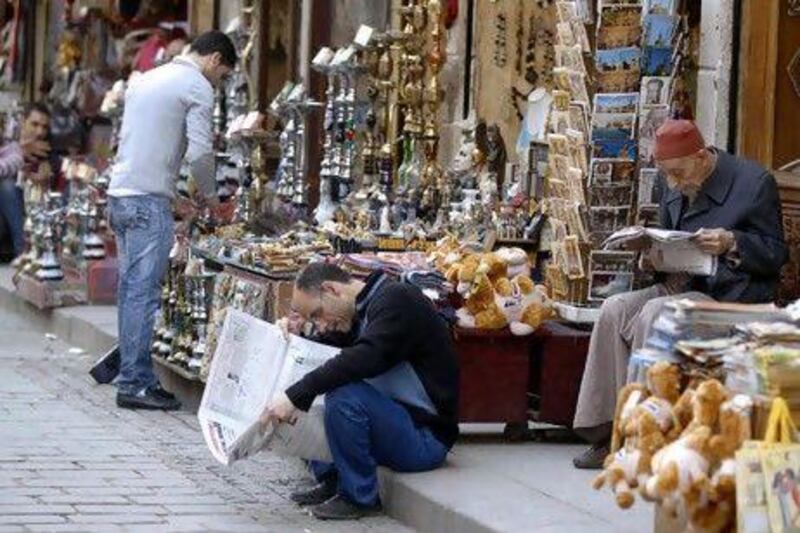CAIRO AND TUNIS // Companies in Egypt and Tunisia are slowly getting back to business as usual following the uprisings that toppled their governments.
But many questions linger over the future of growth and investment in both countries.
Elections are expected to take place this summer and new governments should take power. In the meantime, there is uncertainty.
"Egypt is in transition," said Nabil Fahmy, the former Egyptian ambassador to the US and the dean of the school of public affairs at the American University in Cairo. "The issue is that while there is a referendum on the constitution and new political parties are formed, we have a caretaker government …
"Caretaker governments tend to be populist, especially after a popular revolution. Over the next few months, we will see popular rhetoric and populist interim policies."
Egypt's economy will become more competitive, transparent and entrepreneurial in the coming years as a result of the uprising that ousted Hosni Mubarak, Egypt's president, said Mr Fahmy, who was part of the group of "wise men" who acted as intermediaries between the protest groups and the president.
"If I was an investor with a long-term perspective, I would see all of these reforms as a plus," he said. "If you're a short-term trader, then the next couple of months are going to be a problem."
While shopkeepers have returned to their stores and some financial activity begins to restart, neither Egypt nor Tunisia has returned to full capacity. The Egyptian Exchange in Cairo has been closed since January 27. Despite earlier plans for it to open today, officials say it will remain closed for now, with no date set for its reopening.
Dozens of investors have protested in front of the exchange for weeks. On one side of the argument are investors asking for the exchange to remain shut because they fear major declines; on the other side are brokers and other investment professionals who want it to reopen so they can get back to business.
Sherif Raafat, the chairman and managing director of Concord Corporate Finance and Securities in Cairo and the former head of the exchanges of Cairo and Alexandria, said it was still unclear what the impact of political reforms in Egypt on the economy would be. The stock market would be a major indicator of foreign confidence ahead of elections planned for August, he said.
"As long as it is all political, we don't know what is the agenda for economic reform," Mr Raafat said. "Nobody has talked about it yet. It's still too soon."
The most pressing issue in Egypt is to get tourism up and running again because it is a major source of income for hundreds of thousands of people.
"Resilience of the tourism sector seems to be pretty much a priority," he said.
What remained unclear was how foreign direct investment was affected and whether factories could get back up to full capacity in the face of strikes and demands from protesters, Mr Raafat said.
"We have never been an export-dependent country," he added. "The question is how do you get that velocity of money and the domestic consumer markets going so that demand doesn't collapse."
Real reform to tackle unemployment and stimulate business growth - two root causes of the unrest in Tunisia - could not come until after elections due to take place in July, said Kamel Ayari, an official in the Tunisian agriculture ministry.
"The current government is there for four or five months, so it doesn't have economic or political projects," Mr Ayari said on Friday in Kasbah Square, Tunis, where thousands of people gathered to celebrate the announcement of elections slated for July 24.
"It has to deal with the current affairs of the country. It can have projects for tourism and getting factories working again and all that, but it cannot start big projects that take five or 10 years. That's the project of a new government that will be created after July."
The investment bank EFG-Hermes, based in Cairo, predicted a 3 per cent reduction in Egypt's GDP this year from its previous forecast of 6 per cent. The textiles industry, which exports the nation's renowned cotton products, could be hit by the continuing protests, the bank said.
In Tunisia, executives are hopeful the transition to democracy can serve partly as a foundation for economic growth.
"Social and economic problems will be resolved by the normal functioning of a democratic government that respects individual liberties, that respects national sovereignty, that is not under the dictate of a family who wants to impose their politics," said Moncef ben Salem, a transport executive. "These solutions aren't impossible to find."
And, like Egypt, Tunisia is hoping to get its lucrative tourism industry back up and running ahead of a peak season that starts next month.
Many businesses in Tunis had to shut down at the height of the protests, and while the streets of the capital bustle during the day, many shops still close at dusk.
"Tunisians in the capital don't have confidence," said Mohammed Dbara, the manager of a cafe near the centre of protests, said. "They're afraid at night. At night the only people out are people who are obligated to be out by their jobs and [those] going to clubs. In general, though, it's calm."
At the same time, many people point to the fundamental drivers of the uprising in Tunisia as social and not economic.
"This revolution isn't a 'Jasmine Revolution' for tourism," Mr ben Salem said. "This is a revolution for dignity."
[ bhope@thenational.ae ]
afitch@thenational.ae





